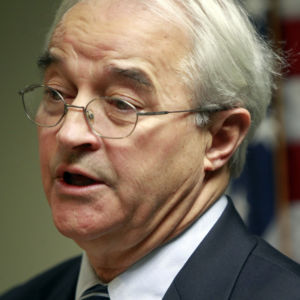This week, Energy & Environment Legal Institute (E&E Legal), the non-profit group engaged in litigation and public education on energy and environmental issues continued its slow pursuit of records relating to former Vermont Attorney General Bill Sorrell’s involvement in the ExxonKnew campaign. For more than a year, E&E Legal has been pursuing a Freedom of Information Act request for public records relating to New York Attorney General Eric Schneiderman’s “climate-RICO,” a scheme to punish companies, including Exxon for purportedly covering up the existence of global warming. Sorrell, who participated in the case during his time as Attorney General, skipped a deposition earlier in the month but sat for one on Monday morning.
“We’re going to have to go back to court and argue over whether the answers he gave were sufficient or not,” said Matt Harding, chief counsel for E&E Legal. “We didn’t really get the answers we were looking for at the deposition.”
Vermont state courts ruled in another case that public records remain public records even when part of a non-work account. Sorrell’s work account had already been searched under a FOIA request. Afterward, it was revealed that, while serving as attorney general, Sorrell had also used a private GMail account. Monday’s deposition focused on whether Sorrell used this account to correspond with Schneiderman and other ExxonKnew supporters as attorney general.
At the deposition, Sorrell, acting on the advice of counsel, declined to answer many of the questions. Rather curiously, he confirmed searching his personal email account for a list of requested terms, including “[Matt] Pawa,” “[Peter] Frumhoff,” as well as the domains “@ag.ny.gov,” and “@democraticags.com.” Pawa is an environmental lawyer who argued an environmental case before the Supreme Court and led the plaintiffs in a case against Exxon similar to the one being made now. Frumhoff is director of science and policy at the Union of Concerned Scientists. He was not allowed to comment on what he found, beyond saying that the search results were submitted to counsel.
Harding told InsideSources that Sorrell’s admission and defense were not something he had seen before.
“Their interpretation of the law, as I understand it, is that we have no ability to ask about what they found and that he is the sole arbitrator of what he is going to turn over and what he’s not,” said Harding. “So whatever he turned over, he turned over, and whatever he didn’t, he didn’t, and according to the Attorney General’s office we don’t have any right to inquire about how he decided what to turn over.”
Sorrell’s counsel argued that further questions into the search process, including details of whether the search included items in the “trash” folder and if any records were found, violated his privacy. This means that E&E Legal does not know if potentially relevant records were deleted either before or after the request was processed.
Harding stresses that he did not want to ask about Sorrell’s personal life and was focused on public records. He says that he was surprised by the amount of resistance he faced from Sorrell’s counsel, particularly since his questions were strictly limited to emails to specific addresses at the Attorney General’s office in New York.
“We aren’t looking for communications between him and his yoga instructor, we’re looking for emails between him and the New York Attorney General’s office,” said Harding. “I can’t imagine that he was emailing them to talk about anything personal.”
In the coming days, Harding and E&E Legal will return to court to argue that Sorrell’s deposition did not satisfy the court’s order. They are hoping that they will be successful in getting the courts to order Sorrell to sit for another deposition. Sorrell’s testimony has become another chapter in a still-lengthening public records request saga.
“It’s sad how long this has gone on. This case has been going on for a year and four months. Public records cases are supposed to get more priority on the docket, because information is sometimes of more value the quicker you get it,” said Harding. “This case was filed when Sorrell was still attorney general of Vermont. He subsequently left office, which has caused all kinds of problems since he had to be added back into the lawsuit.”
As the case continues, both the fees and impact of the case are increasing. E&E Legal is hoping that the records it eventually gains will show the public how Sorrell, during his time as attorney general, used his office for political purposes.
“The larger point is to show how legitimate law enforcement differs from political posturing. The attorney general is a politician–he is elected every two years in Vermont–but he is also a law enforcement officer,” Harding concluded.

